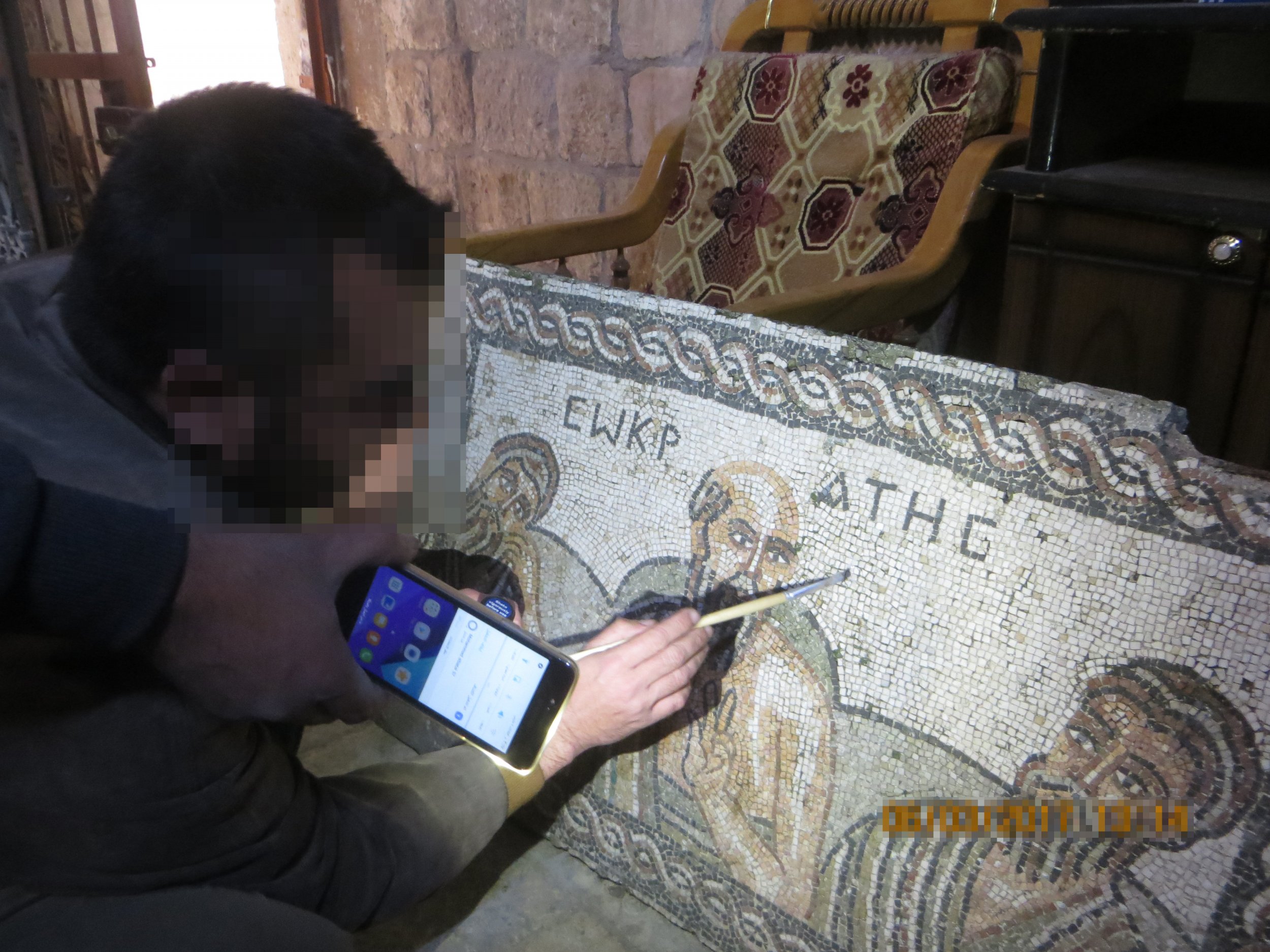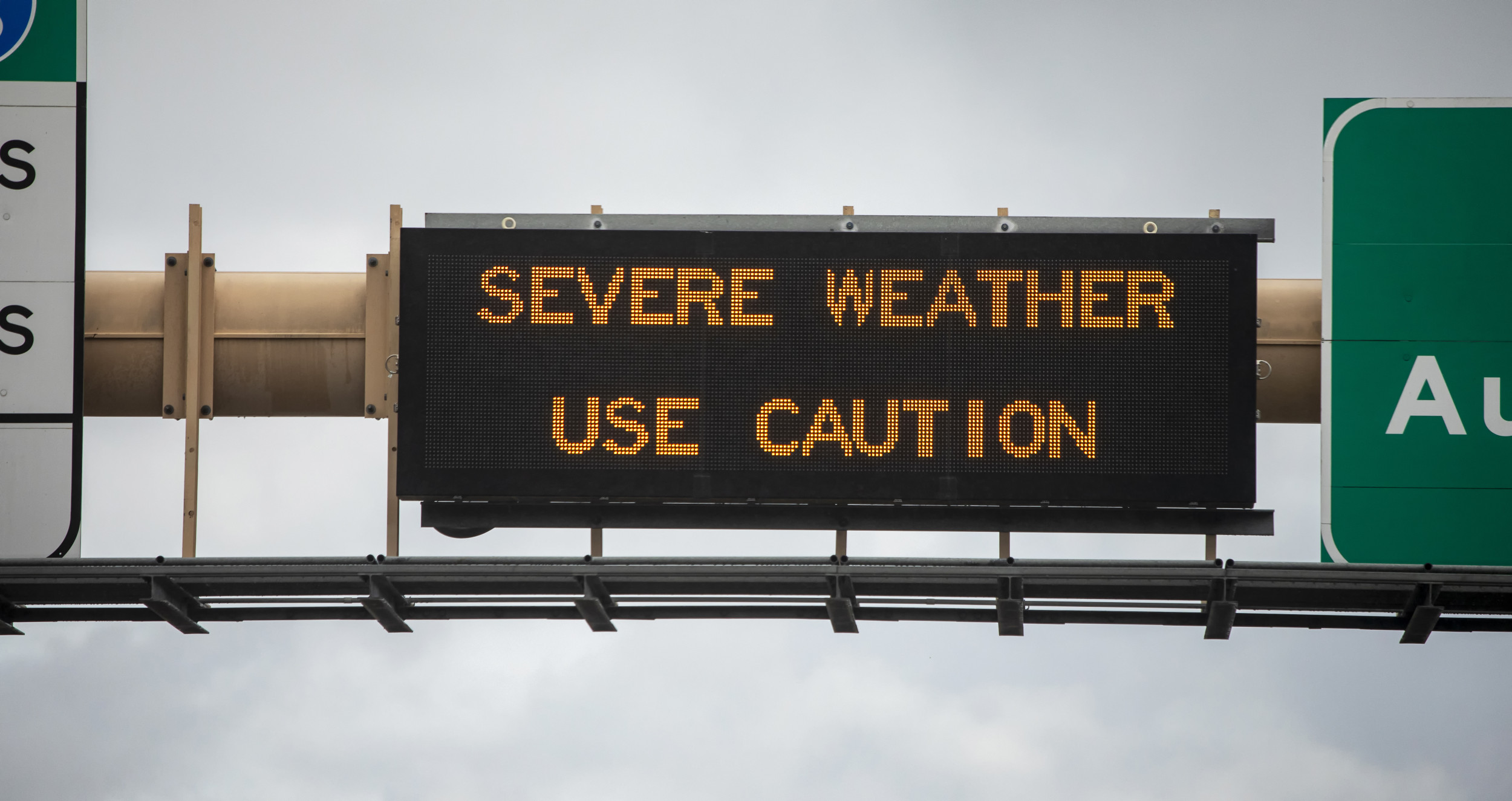
Updated | A team of Syrian archaeologists in Turkey received a box in January that could have been meant for a detective agency: It contained small bottles, brushes, a sprayer and an ultraviolet light. Inside the bottles was a traceable liquid that the team hopes will deter looters from targeting Syrian artifacts, or help authorities track the artifacts if they disappear—cutting off a reported source of revenue for ISIS. A month later, the archaeologists smuggled the box across the Syrian border and brought it to a museum in Ma'ara, where they used brushes to apply the liquid to treasured mosaics.
For years, cultural heritage experts and government officials around the world have warned that ISIS is profiting from the looting and trafficking of antiquities from the regions it controls. While the militant group has destroyed certain sites and artifacts, such as in Mosul, Iraq and Palmyra, Syria, it also provides licenses and oversees looting elsewhere. The profits from that operation help fund the group's attacks, according to reports.
Related: How ISIS makes millions from stolen antiquities
The Syrian archaeologists hope the traceable liquid will help put a stop to that. The technology has been around for some 20 years, says Colette Loll, a cultural heritage expert and senior adviser to the SmartWater Foundation, the not-for-profit arm of a company that produces forensic traceable liquid, which is behind the effort. (The foundation and company are unrelated to the Coca-Cola-owned brand of the same name.) But a new formula for the solution, for use on materials such as pottery, stone and ceramics, was developed by SmartWater and was tested by scientists and archaeologists at Shawnee State University in Ohio and University of Reading in the United Kingdom, she says. The clear, odorless liquid should withstand the weather conditions in the Middle East and North Africa and last for years. It is visible only under ultraviolet light.
If a marked artifact turn ups, according to Loll, "all we have to do is take a microscopic swab from that material and send it into a forensic lab, and that forensic lab can actually pull the data…. It can actually be traced right back to the museum from which it might have been taken."
For most of the items looted and sold, it's "very difficult to determine" where they originally came from, says archaeologist Amr Al Azm, an associate professor of history and anthropology at Shawnee State, who oversaw the initiative. This liquid solves that problem, as each solution has its own forensic code, enabling law enforcement to match an object to a database. "Each time we use one of those bottles on a group of objects, it provides a unique signature," he says.
Concern about the looting and trafficking of antiquities from ISIS-controlled areas has been growing for years. The FBI issued warnings on the subject after a May 2015 raid on the home of an ISIS leader turned up artifacts, receipts from their sale and excavation permits. Reporters for CBS News and Italy's La Stampa have gone undercover as interested buyers. In 2014, a UNESCO official estimated that the underground market for stolen antiquities is worth $7 billion. Last April, the Russian ambassador to the United Nations said ISIS was making $150 million to $200 million per year from the trade. The U.S. government issued a $5 million reward for information that can be used to disrupt the group's antiquities operation.
But some analysts are becoming increasingly skeptical that ISIS is making significant amounts of money this way, or that such artifacts will wind up in major Western galleries and museums.
In February, the International Center for the Study of Radicalization and Political Violence at King's College London released a report that said the sale of antiquities likely has not been a major source of income for ISIS. "Rather than trading artifacts, Islamic State is earning money from selling digging permits and charging transit fees," the report said. "Exactly how much is impossible to say. Most of the data points put the income generated from these activities at the lower end of the group's revenue streams—and one which is likely to decline further as territorial reversals prevent the group from accessing many sites."
"We need to dial back the hyperbole," the lawyer Kate Fitz Gibbon said at a Lawyers' Committee for Cultural Heritage Preservation conference in March 2016. She described the loot as "minor artifacts" that are "of no interest to museums or collections anywhere in the world, and they wouldn't be even if they were totally legal." She added that the objects are the sort of "junk" typically sold to tourists.
Gary Vikan, a councilor with the Maryland State Arts Council and the former director of the Walters Art Museum in Baltimore, is another skeptic. "If you want 10,000 bucks to carry out a terrorist attack, you sure as hell are not digging up pots," he says, citing reports that the November 2015 Paris attacks cost $10,000. He adds that major museums are not paying the big figures being reported for antiquities from this region. "Show me one object," he says.
That's not to say looting isn't happening. Using satellite imagery, a 2015 study published in the journal Near Eastern Archaeology estimated that looters had likely targeted more than 3,000 of Syria's 15,000 major archaeological sites since the ongoing conflict began. "This represents a truly unprecedented expansion in looting activity and thus a dire threat to the region's archaeological heritage," the researchers wrote.
"I don't doubt for a second that somebody dug those holes," Vikan says. "What I'm asking is, what did they get out of those holes, if anything? And if they got something, where is it?"
The team behind the traceable liquid remains undeterred, even if those people concede that ISIS perhaps is not profiting as much as reported. "We know that these objects are disappearing, we know that they're being looted," Loll says, "regardless of who is sponsoring the trafficking."
Al Azm agrees: "We have seen it show up on the market. We have seen it actually being sold." He also points to evidence that the group operated what it called a Department of Precious Resources to oversee resources found in the ground, including artifacts, and the satellite imagery. "People don't use that kind of energy and that kind of time and that kind of effort if they're not making money from it," he says.
Regardless of how much ISIS profits, Al Azm says, preserving Syrian history is essential to the country's survival after the conflict ends. "One day when this war is over, this shared common history might become a bridge that we can reach across and begin to communicate with each other again," he says. "Saving that past is also about saving Syria's future too."
Correction: This article previously incorrectly stated that archaeologists at Shawnee State University and University of Reading developed a traceable liquid. SmartWater developed the liquid and scientists and archaeologists at those universities tested it.
Uncommon Knowledge
Newsweek is committed to challenging conventional wisdom and finding connections in the search for common ground.
Newsweek is committed to challenging conventional wisdom and finding connections in the search for common ground.
About the writer
Max Kutner is a senior writer at Newsweek, where he covers politics and general interest news. He specializes in stories ... Read more
To read how Newsweek uses AI as a newsroom tool, Click here.








